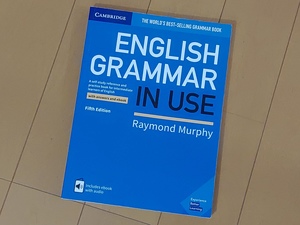
ENGLISH GRAMMAR IN USE (英語ノンネイティブ向け英文法書の定番)名前: 小川 邦久 リンク: https://kunisan.jp 日付: 2019年6月9日 
 ここ最近の英語学習は、本を読みながらの英単語の勉強が中心でしたが、たまたまYouTubeの英語学習関連の動画を見ていたら、その中で「ノンネイティブの英語話者は、皆"ENGLSIH GRAMMAR IN USE"で学んでいる」というコメントがありました。私は大学時代から含めて色々な文法書を読んできたこともあり、英文法についてはそれなりの知識を持っていると自負しているのですが、復習がてら久しぶりに文法書を読んでみようと思い、アマゾンで購入してみました。英単語の学習はちょっとだけ休止です。 ここ最近の英語学習は、本を読みながらの英単語の勉強が中心でしたが、たまたまYouTubeの英語学習関連の動画を見ていたら、その中で「ノンネイティブの英語話者は、皆"ENGLSIH GRAMMAR IN USE"で学んでいる」というコメントがありました。私は大学時代から含めて色々な文法書を読んできたこともあり、英文法についてはそれなりの知識を持っていると自負しているのですが、復習がてら久しぶりに文法書を読んでみようと思い、アマゾンで購入してみました。英単語の学習はちょっとだけ休止です。"ENGLSIH GRAMMAR IN USE"は洋書ということで、全て英語で書かれています。ですので英語初心者には向きません。最初から最後まで通して読んでみた限り、英検で言うと2級程度、TOEICで言うと500~600点位の人に最適な感じがします。さらに上の英検準1級、TOEIC700~800点あたりの人も、基礎知識の穴を埋める上では悪くないと思います。 私はこの本の前半~中盤の9割以上の内容は「知っている」というものでしたが、それでも「こういう言い方でも文法的にはOKなのか」という発見があったり、実は今まで勘違いして使っているような表現もあったりしました。 後半の方で前置詞や句動詞(phrasal verbs)が出てきましたが、前置詞については自分の不正確な使い方が結構あることが分かり、句動詞については知らない表現が多数でてきました。これについては文法よりも「語彙力不足」から来ているのかなとも思います。 そんな感じで、今回勉強になった文法表現等についてまとめておきます。 [ 文法 ] ・I've lost my keys again. I'm always losing them. →進行形で「通常よりも頻繁に…」ということを強調する。 ・They've been married (for) ten years. →forがあってなくてもOK。 ・"What shall we do? Shall we walk?" "We might as well." →may/might as well: ~してもよい、~するのも同然だ、~した方がましだ、~してもよいだろう ・It's late. It's time we went home. →"It's time 主語+動詞過去"で、「(既にそうなっていなければいけないのに、そうなっていないので)そうしなければならない」という状態を表す。 ・Whenever Eric was angry, he would walk out of the room. →"条件文+would"を使って、過去の定常的な行動を表す。 ・When are you going to get the roof repaired? →"get+目的語+動詞の過去分詞"は、目的語の後のto beは不要。目的語が能動態の場合は"get+目的語+to+動詞の原形"。 ・Sean said (that) he woke up feeling ill, so he didn't go to work. ・Sean said (that) he had woken up feeling ill, so he hadn't gone to work. →どちらも同じ意味。過去形でも過去完了でもどちらでもOK。 ・Sean said not to worry about him. →"Paul told me not to worry about him"と同じ意味。 ・I'm right, aren't I? →付加疑問文でI'mの場合は、"aren't I"が付く。 ・Michael suggested going to the cinema. ・Michael suggested (that) we go to the cinema. →どちらも同じ意味。"suggest (someone) to 動詞の原形"の形は取らない。"advise (someone) to 動詞の原形"と混同しないように。 ・It's starting to rain. →"starting raining"のように〜ingを重ねない。 ・I didn't like the way the furniture was arranged, so I tried moving the table to the other side of the room. But it didn't look right, so I moved it back again. →"try something"や"try ~ing"は試験的または実験的に何かを行うニュアンス。"try to+動詞の原形"の「~しようと試みる・しようとする」とは違う。 ・It's a difficult problem. It needs thinking about carefully. →"It needs to be thought ..."と同じ意味。 ・I prefer to drive rather than travel by train. →"prefer to 動詞の原形"の後は、前置詞"to"ではなく"rather than (do) ~"の形を取る。 ・"Who's going to drive, you or me?" "I'd rather you drove." →I'd rather somebody did something"の形もある。 ・There's no point in having a car if you never use it. →no point in ~ing: ~する意味が無い ・I had no trouble finding a place to stay. →"trouble/difficulty/a problem"の後は"~ing"を取るが、"to 動詞の原形"は取らない。 ・Jane is a very good student. She's bound to pass the exam. →be bound to: 確かに~するはず ・I was afraid to go near the dog because I was afraid of being bitten. →"be afraid to 動詞の原形"は「怖いので~したくない」、"be afraid of ~"は「~が起きるので怖い」 ・The news was unexpected. →"news"は不可算名詞。 ・There are millions of stars in space. ・I tried to park my car, but the space was too small. →宇宙空間を表す"space"は無冠詞。 ・a/the Chinese, a/the Japanese, a/the Portuguese ・an Italian/Italians, a Mexican/Mexicans, a Thai/Thais ・a French man/the French, a Dutch man/the Dutch, an English man/the English →「~(国籍)人」の表し方(単数/複数)が国によって異なる。 ・pajamas →パジャマは上下セットで複数形の概念。 ・"a means of transport," "many means of transport" ・"a TV series," "two TV series" ・"a species of fish," "200 species of fish" →means、series、speciesは単数も複数も同じ形。 ・I like living by myself. →"by myself"は"by my own"にも置き換え可能。"自分ひとりだけで"という事を強調。"I made the cake myself."のように「自分で」という意味の場合には"by"は不要で"myself"のみ。 ・Nobody is perfect, are they? →主語が"nobody" "no one"の場合には、代名詞they/them/theirで受ける。 ・My room is fairly big, but I'd prefer a bigger one. →強さの順番: very > quite/rather/pretty > fairly > a little ・Sara didn't do as well in the exam as she had hoped. ・I don't know as many people as you do. ・Petrol is twice as expensive as it was a years ago. →(個人的に"as ... as"を使う場合の語順が曖昧だったのでメモ) ・My friends are all going out tonight. →"All of my friends are going out tonight."の語順を変えたもの。 ・I'd better write down my password in case I forget it. ・Shall I draw a map for you in case you have a problem finding our house? ・I gave him my phone number in case he needed to contact me. →"in case ~"は実際に「する・しない」に関わらず「~した場合の念のため」にというニュアンス。最初の文は「忘れる、忘れないにかかわらず、忘れた時のために念のためパスワードを書き留めておかないと」という意味。"in case"と"if"は同じ意味ではないので注意。 ・In case of fire, please leave the building as quickly as possible. →"in case of"は"if there is"と同じ意味。 ・I don't feel as though I've had a holiday. →"as though"は"like"や"as if"と同じ意味。 [ 前置詞関連 ] ・on time: ちょうど、in time: 間に合う、just in time: ぎりぎり間に合う ・at the end of January/at the end of the month/at the end of the film/at the end of the course (in the end of ...とは言わない) ・We had a lot of problems with our car. We sold it in the end. ("in the end" =「結局は」) ・on a map/on a menu/on a list/on a page/on a website ("in"ではない) ・The TV is in the corner of the room. ("in the corner"は部屋の中の角の意味。"at"ではなく"in") ・There is a small shop at the corner. ("at the corner"は建物の外の角の意味。"in"ではなく"at") ・We had dinner at the hotel. All the rooms in the hotel have air conditioning. (後者は"at the hotel"ではない) ・They came in a taxi. ("by a taxi"ではない。"by taxi"ならOK) ・They didn't come in their car. ("by their car"ではない。"by car"ならOK) ・The train was late, but nobody knew the reason for the delay. ("reason of"ではない) ・The cause of the explosion is unknown. ("cause for"ではない) ・Kate is married to an American. ("married with"ではない) ・Kate is married with three children. (「結婚して子供が3人いる」という意味) ・I don't care for hot weather. ("I don't like..."と同じ意味) ・It was my idea. I thought of it first. ("thought of" = アイデアが浮かんだ) [ 句動詞(phrasal verbs)関連 ] ・"I turned on the light." "I turned the light on." (名詞の場合にはどちらに配置してもいい) ・"I turned it on." (代名詞の場合には"I tuned on it"とはできない) ・"I'm going to take off my shoes." "I'm going to take my shoes off." (名詞の場合にはどちらに配置してもいい) ・I'm going to take them off. (代名詞の場合には"take off them"とはできない) ・cross out: 書いてある言葉等に打消し線を引く、work out: 進んでいる(進捗・発展の意味で)・計算結果は~・計算する、give out: それぞれの人に与える、try out: 大丈夫か確認/テストしてみる ・drive on/play on/walk on: 運転を/演奏を/歩き続ける、get on (with): 中断の後などに~を継続する ・doze off/drop off/nod off: 眠る、finish off: 継続している作業の最終的な所を実行して終わらせる、put (somebody) off: (人)に対して~を中止させる、rip off: だまし取る・ぼったくる、talk off: 間違った行い等に対して怒りを交えながら伝える ・knock down: (建物を)取り壊す、cut down on: ~(取りすぎていた/やりすぎていた食べ物/飲み物/物事等)の量を減らす ・keep up: スピードやレベルを維持しながら続ける、take up: 趣味/スポーツ/アクティビティを始める、fix up: (ミーティングなどを)準備する(= arrange)、wash up: (食事の後お皿などを)洗う、make up: 構成する、take up: 空間や時間などが占める、turn up: 現れる・到着する、use up: 使い切る、bring up: 議題・議論に(話題を)持ち込む、save up (for ~): (~のために)お金を貯める、tear up: 破ってバラバラにする、do up: (コートの)ボタンを閉める・(靴紐を)締める・(ネクタイを)締める・(建物や部屋などを)修復/改善する、hold up: (人を)遅らせる ・get away: (難しいながらも)逃げる、get away with: (捕まることなく)間違ったことをやり遂げる、give away: 不要なので誰かにあげる 英語学習関連記事(リンク一覧): MLB中継や選手・監督インタビューで英語学習 / NetflixでSeinfled(となりのサインフェルド)の全エピソード視聴完了 / Duolingo - 初心者向け外国語学習アプリ / 4か月ぶりのTOEIC L&R(オンラインIP)で初のリーディング満点 / インテリ君の英語遊び TOEIC®英単語・英熟語 - プチコン4で英語学習ゲーム / ...(記事連続表示)

最近の記事: ドラゴン対ゴキブリ千匹 - プチコン4でスプライト1000個を使ったゲーム / HandBrake - 動画ファイル一括変換ソフト / 笑って!ダミーちゃん - プチコン4でマイナーキャラの掘り起こしゲーム / Switch 2対応USB-Cハブ / Switch 2を購入 / あけましておめでとうございます(2026年) / インテリ君の英語遊び MLB中継編 - プチコン4で野球/ベースボール英語の学習ゲーム / A-TO-Z DASH - プチコン4でテキストベースのシンプルアクションゲーム / おばあさんが坂を駆け上がるゲーム - プチコン4でドリフの坂道コントをヒントにしたシンプルゲーム / ツインスティック・チェーン・ブラスト - プチコン4で連鎖爆発のシンプルSTG
■ ホームへ
|

